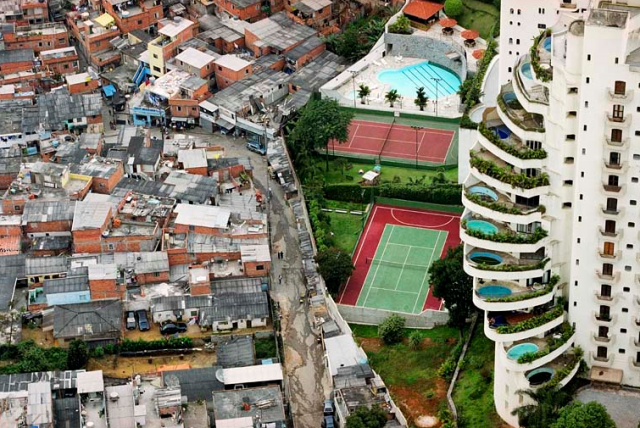On this 17th of October, International Day for Poor People, noble and well-intentioned beautiful declarations will be made to honour people rendered and living in poverty.
There should be no mistake about it: people are not born poor, they are made poor. An economic and social system that takes away their livelihood, destroys their environment, poisons their water and their land is a murderous system that should be condemned. In wealthy countries, the mechanisms are different but the result is the same. Poor people are those who have no jobs, who fall out of social security, who have pensions or other allowances far below the poverty line.
We have many mechanisms to ‘help’ poor people. In rich, northern countries we have tens of thousands of poverty associations that do what they can, they rightly focus on the poor’s human rights, they try to ‘empower’ poor people so they can claim their rights. But they cannot give the poor what they need: a decent income.
In poorer countries in the South, the World Bank decided it is growth that will reduce poverty. And whatever doubts we may have about their poverty statistics, it is a fact that extreme poverty was reduced dramatically since 1990. Extreme poverty. After that, people still live in poverty. And can easily fall back. And the economic growth that happens, does not reach them. In the Middle East and North Africa, according to the World Bank, extreme poverty has almost doubled these past years. The impact of COVID will be ‘swift and substantial’. But COVID is not the only reason, there is climate change and there are conflicts. How could the situation improve?
Political will?
‘We must take the right actions now!’, says IMF Director General Georgieva. Which is not saying anything, because all depends on what these ‘right’ actions are. IMF recipes? Social policies? Alternative economic policies? Who defines the ‘right’?
On this 17th of October there will be many solemn declarations. The floor will be given to ‘real’ poor people, those who know what it means to be poor. So what?
Is there anyone who really wants to eradicate poverty? In the North? In the South?
Is there anyone who really fights for a capital tax? Is there anyone to propose to eradicate tax havens? To fight illicit financial flows from the South? Is there anyone to condemn hypocritical ‘development policies’ while more money travels from South to North than vice versa?
No.
Some NGO’s do very good work, but do they have any power? Is their ‘advocacy’ as strong as the ‘lobbying’ of transnationals? No.
For sure there is more than enough money in this world to give everyone a decent income, good health care, professional education with a school meal, decent housing, public transport, internet …
According to a recent UBS report, there are 2,189 billionaires in this world. Together, they have 10,2 trillion US Dollar, which means: 10.000.000.000.000. All zero’s, yes, but it means a lot of money. And it concerns people who work on new technologies and … in the health sector.
What do these people do with their money? No, they do not pay taxes. They do give some crumbles to philanthropic projects. And deduce these amounts from their taxable incomes. Two hundred billionaires last year spent more than 7 billion US Dollar on philanthropy. Because they need a good conscience. Because they want a ‘fair’ world, and they define what ‘fair’ means.
Bill Gates, one the world’s richest philanthropes has been making good money during this crisis. COVID is indeed a black cloud with a nice silver lining. For those who are sitting on the right side.
Can anyone say there is no money to help the poor?
The most vulnerable?
When will we have the courage to say there is no political will to eradicate poverty? To stop rendering people poor? To reduce inequalities? For decades, researchers are looking for more and better theories to define poverty, but in spite of their mostly good intentions, these are only excuses to not do anything more concrete.
As if ‘multidimensional poverty’ were not a perfect excuse to forget that in every market economy poverty is an income deficit.
And so we continue to study energy-poverty and housing-poverty and food-poverty, while the World Bank talks about ‘cognitive taxes’.
Hardly anyone promotes full social protection, with guaranteed incomes, living wages … No one talks about how to prevent poverty. One promotes growth, as if this growth can help poor people.
We should stop to put the world upside down. If we really want to help poor people, we should look at the rich. We do not have to look for the poorest of the poor, the most vulnerable among the vulnerable, women, children, refugees. Solutions are to be found at the other side: do not go and visit the slums if you want to know what poverty is, go and visit the wealthy neighbourhoods, at least if they allow you to get in.
We do not have to make a selection among the poor, looking exclusively at the extremely poor while forgetting the ordinary poor people who never have enough to reach the end of the month. All poor people are on the losing side. If you want to help them, go and look at the winners and tax them. And change the system.
Poverty should be made illegal.




